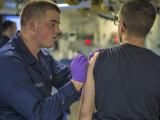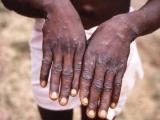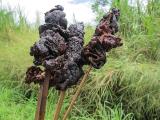Editor's note: See Aug 21 CIDRAP News story for a critique by Dr. D. A. Henderson of the report described below.
Aug 19, 2003 (CIDRAP News) A study of more than 300 people who received smallpox shots suggests that the resulting immunity to smallpox may last up to 75 years, according to a report published online yesterday by Nature Medicine.
"We found that more than 90% of volunteers vaccinated 25-75 years ago still maintain substantial humoral or cellular immunity (or both) against vaccinia, the virus used to vaccinate against smallpox," states the report by Erika Hammarlund and colleagues at Oregon Health and Science University in Portland.
The researchers found that levels of vaccinia-specific antibodies (agents of humoral immunity) remained "remarkably stable" for as long as 75 years after vaccination. Cellular immunitylevels of T cells active against vacciniadeclined slowly after vaccination, but T-cell responses could still be detected after 75 years, according to the report.
Although some epidemiologic studies have indicated that smallpox vaccinees may remain immune for many years, the general belief is that immunity lasts only 3 to 5 years after vaccination, the authors say. They note that more than 90% of Americans older than 35roughly 140 million peoplereceived smallpox shots in childhood. If the levels of immunity the researchers found are at least partially protective, they write, "then the morbidity and mortality associated with an intentional smallpox outbreak would be substantially reduced because of pre-existing immunity in a large number of previously vaccinated individuals."
The authors analyzed immunity in 306 vaccinated volunteers and 26 unvaccinated controls. Most of the vaccinees had been vaccinated only once or twice, but about 25% of them had been vaccinated three or more times. An intracellular cytokine staining protocol was used to measure levels of vaccinia-specific CD4+ T cells and CD8+ T cells (those that produced two antiviral factors, interferon gamma and tumor necrosis factor alpha, when exposed to vaccinia). The researchers also developed and tested a vaccinia-specific ELISA (enzyme-linked immunosorbent assay) for high-throughput analysis of humoral immunity.
The researchers found "robust" levels of vaccinia-specific CD4+ and CD8+ T cells (about 900 per million T cells) in volunteers who were tested about 1 month after vaccination. Tests of other volunteers indicated that the T-cell levels declined slowly, with a half-life of 8 to 12 years for CD4+ cells and 8 to 15 years for CD8+ cells. Booster vaccination did not substantially improve the numbers or half-life of either type of cell. It was also found that some volunteers "preferentially lost CD8+ T-cell memory" while maintaining CD4+ T cells.
The analysis of humoral immunity showed that "vaccinia-specific serum antibody levels were remarkably stable between 1 and 75 years after vaccination," indicating "essentially a lifetime of antiviral antibody protection after a single acute viral infection." The level of antibodies was slightly higher after two vaccinations than after one, but additional vaccinations did not yield any further increase in long-term antibody production.
The authors looked for but found "no correlation between virus-specific T-cell numbers and antibody titers at early or late time points, thus indicating that humoral and cellular immunity are independently regulated," they write.
Because naturally occurring smallpox is extinct, it may be impossible to definitively identify the immunologic indicators of protection against smallpox, the researcher say. They suggest that cellular and humoral immunity are probably both involved, but what combination of the two mechanisms is necessary for full protection remains unclear.
In their discussion, the authors cite several large epidemiologic studies showing that smallpox vaccination protected 90% to 95% of vaccinees from lethal smallpox disease for many years and possibly for life. That evidence "dovetails well" with their own findings of long-term humoral and cellular immunity, they assert.
The researchers conclude that their finding of measurable immunity in more than 90% of vaccinees "will affect future models of potential smallpox outbreaks in contemporary populations."
Hammarlund E, Lewis MW, Hansen SG, et al. Duration of immunity after smallpox vaccination. Nature Med 2003 (early online edition, Aug 17) [Abstract]
















